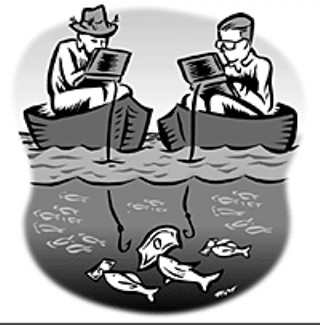Never Content
David Talbot and Michael Hirschorn Search for Profits in a Sea of Free Online Information
By Roger Gathman, Fri., March 2, 2001

2000 was an especially hard year for online content sites. Some, such as APB Online, a crime journalism site which at one point employed two Pulitzer Prize winners, have gone under. Others, such as Healtheon, the company started by Netscape founder Jim Clark, have merged and transmogrified and tried, with changes of management and purpose, to wring from their business plan some drop of justification for their continued existence. So much venture capital, so little return. The new metric of failure on the Web is whether one's company has the misfortune to appear on www.fuckedcompany.com -- a site that takes morbid and gleeful delight in watching at the deathbeds of fading dot-coms.
This is the mood confronting two high-profile speakers at this year's SXSW Interactive conference -- panelist David Talbot, founder, chairman, and editor-in-chief of Salon, perhaps the Web's best-known magazine, and keynote speaker Michael Hirschorn, editor-in-chief of last year's most ballyhooed start-up site, Inside.com, a source for entertainment industry professionals.
Both men have been on the media frontline throughout their careers. And both are well-versed in the pitfalls of providing a product -- online content -- that, so far at least, has few willing buyers. But the two have taken different approaches to achieving profitability on the Web -- Hirschorn by charging a premium for the most "inside" information on his cutting-edge entertainment news site, and Talbot by relying on ads and revenue from "extras" like members-only chat rooms.
Talbot comes from a background that couldn't be more Ur-California: His father, Lyle Talbot, was a character actor in Hollywood. "My father was very political -- conservative political. He was raised on a small town in Nebraska, and he taught himself" by reading magazines, Talbot says. "He was an autodidact."
Talbot's first brush with the power (and potential for unexpected consequences) of the media was at Harvard Prep School, where he edited the literary journal. "I was unofficially expelled, because I turned the journal into an anti-war manifesto. The school not only confiscated the whole issue, but I was called in and given one of those offers I couldn't refuse. So I left the school."
Later, Talbot went on to edit Mother Jones ("an experience that convinced me I never again wanted to be involved in a politically correct or one-sided organization") and the Culture and Arts section of the San Francisco Examiner. The idea for Salon arose during a strike at the Examiner. "I was on the management side, as an editor, but the employees put out a strike paper online, and I was impressed." (Scott Rosenberg, who now edits the technology section of Salon, was among the striking employees.)
"I had been thinking for a while of a book review magazine," Talbot continues, "because you know, with books, you can cover an awful lot of ground -- politics, the arts, music, you name it. And I saw this new way of putting out a magazine like that."

Michael Hirschorn's lineage, in contrast, is East Coast media of the purest blood. "My background, before I came to Inside.com, was as a magazine editor, first for New York Magazine, where Kurt [Anderson, co-founder of Inside.com] was also working and [as editor-in-chief] at Spin. When I went to Spin, it wasn't an obvious move to make. I'd reviewed music in college, but I wasn't a music writer."
Hirschorn did know about youth culture, however -- an influence that gave Spin a much sharper, more ironic style. This made some critics happy, but it didn't please Bob Miller, the owner of Miller Publishing, which owns Spin. Miller fired Hirschorn in a highly publicized dispute over the direction the magazine was headed.
From Hirschorn's perspective, his career has followed two rules, from New York Magazine to Inside.com, which he and Anderson founded in 2000. "One, you find and publish breaking news. Two, you make people think about things in fresh ways. You provoke discussion, and to do that you take on big, sometimes unexpected topics." For example, an early Spin article on the growing presence of white people in rap music, which predated the Limp Bizkit/Eminem phenomenon, "got tons of feedback," Hirschorn says. "If you do important things like that, things that might seem raw or on the margins, you'll get noticed, because people want that.
"To me, right now, there's a general media malaise. Writing ... from the central media, the magazines and newspapers, is bland, tedious, and boring," Hirschorn says. "There's a weird double dynamic right now in media, where on the one hand there's more concentration of power in a few media companies -- like maybe seven dominate internationally -- and there's also more fractionalization, as with urban music, the Net, the sources of information. Matt Drudge. It puts pressure on the mainstream media."
Ever since its inception as a biweekly literary magazine in 1995, Salon has tried to differentiate itself from the mainstream media -- first as a marginal online player and later as a widely read general news site that provided not just information but incisive commentary on the day's events. Talbot credits the site's evolution partly to the Net's ability to empower marginal publications like Salon.
And, partly, to Princess Diana. "The weekend Diana was killed, our newspaper instincts kicked in, and we covered it. And we saw our circulation skyrocket. It was then we experienced how the Web, because it is diffuse and direct, could work as a faster vehicle of information than newspapers. So we made the decision to go daily, and to build the site around commentary. We abandoned the New Yorker model."
Salon came into its own around the time of Bill Clinton's impeachment. Talbot still gets excited, and a bit nostalgic, talking about the controversy.
"We thought that there was, in the mainstream media ... an overly hysterical reaction to Clinton's sins. And we had a reporter -- Murray Waas -- who came to us with a lot of stories, which we ran, about the Starr investigation." In fact, Salon may have made an impact on the Starr report. "An FBI source close to Starr's office told us that when Starr presented his report, he excluded the Whitewater information because Salon had already discredited the sources of it," Talbot says.

"What this meant was, we were tarred as Clinton's dupes. Really, we were just doing our job." For example, Talbot says, the next exposé Salon ran, about "how Clinton's anti-drug office was putting out money in the media to plant anti-drug messages, could be considered anti-Clinton."
The Clinton scandals coincided with the brief era of "irrational exuberance," as the markets seemed to reward any company whose name was followed by "dot-com." "In the early years of the Web, people's feet left the ground for too long. The bad habit of postponing your profit indefinitely, that became too widespread, with companies going for market share too religiously." To an extent, Talbot says, Salon fell victim to that habit too. "[A]fter the IPO, we did overspend, we ramped up the staff." They also ramped up the budget, which was around $30 million at the start of last year. In June, however, Salon started to retrench, cutting 73 workers as well as the magazine's freelance budget. By the end of the year, Salon's budget had slimmed down to a comparatively meager $12 million.
Still, Talbot says, "we've had to depend on advertising" at a time when companies are shying away from advertising on the Web. "Our challenge this year is to make a profit." How will Salon accomplish that elusive goal? "What we need to do is launch some form of reader revenue. We aren't going to gate Salon, but we have been discussing creative ways for readers to support Salon." With 50 million page views in January, Talbot says, Salon has "an immense readership. And we have expressions of loyalty, people who love us, people who write me and say Salon and NPR [National Public Radio] are daily staples. So how many of those people will part with some money to support us? We get half a million already from the Well," a paid listserv/discussion group. "These are people who are willing to pay for that service."
Last year, Salon went public with its efforts to become a multimedia giant. Since then, Talbot has moderated his rhetoric: "Rainbow [a cable network that owns 10% of Salon] talked to us about a Salon TV show, but the numbers showed it was a break-even proposition. We did three books, but they were all break-even, too. We've put these things aside." Salon is, however, planning a weekly radio program, which will feature Salon commentators such as Garrison Keillor and be bundled with NPR's This American Life.
All of this proves, according to Talbot, the need of Web content to constantly evolve and change with shifting reader preferences. "A lot of the ideas about media and design that were floating around the Web in the early days aren't panning out. Take our site design -- it is much more utilitarian now, much less artistic. Great production values aren't a good use of the medium at this stage," says Talbot, who learned that lesson the hard way when Salon's gawky site redesign last May was panned by users and critics as ugly, pointless, and difficult to navigate. Soon after, the redesign was history.
Hirschorn's Inside.com debuted largely as a subscription service, "although out in front of the gated section is a large free playground," Hirschorn says. While the main news section is free, access to Inside's "premium news and features," along with a subscription to the monthly print magazine, is $19.95 a month, or $199 a year. "We are happy with the model. From our perspective, we don't believe you can build a complete business on the Web. It must be in tandem with an extra-Web component. We have the magazine, and we have a conference business."
Hirschorn also has a perspective on how the Web has changed. "We are in the midst of the third washout on the Web. The first was technical, as a lot of the mechanics of the Web, the tools, became obsolete or didn't spread. In the second, a lot of the original ventures on the Web went belly up. Now, this third phase isn't just about the Web. It is about how all content is becoming digitized and networked." In the future, television will look more like Napster, Hirschorn says, with consumers sifting through "an infinite supply of video" and choosing what they want to watch. People's entertainment choices, Hirschorn continues, will be made in an "ad hoc marketplace, where individuals download what they want. So what is coming, in terms of content, might not be over the computer at all. Look at what Sony is doing with games, with interactive TV. You need to think of the future in terms of a networked system, which isn't necessarily about computers. I'm platform agnostic," he says with a laugh.
As for general interest sites and magazines like Salon, Hirschorn is not optimistic. "General interest things, not only on the Web, but [general interest] magazines, the big three networks, are having a hard time because they don't reflect our society any more, which is highly decentralized. There was a time when people had Life, Time, they had NBC, CBS, ABC -- but people aren't listening anymore."
Talbot, perhaps quixotically, is also enthused about the Internet's tendency to decentralize general-interest and mainstream media -- though for notably different reasons. "One of the things I like is that Salon is out here in San Francisco. It isn't part of New York. Fuck New York. What has come out of there that is really interesting since, say, Vanity Fair in the Eighties?" If and when the current economic downturn ends, Talbot predicts, there will be more money, and more competition, and more room on the media landscape for liberal, anti-establishment voices. "It sounds odd to say it, but the liberal voice, under Clinton, was more muted than ever," Talbot says. "That is because the political media is geared to the angry white male. I think there might be a liberal comeback, as liberals get angry. It ought to be interesting." ![]()
Michael Hirschorn delivers his keynote speech at SXSW Interactive on Tuesday, March 13, at 10am. David Talbot conducts a panel titled "Don't Cry for Online Content" on Monday, March 12, at 1:30pm. Both editors appear on the panel "Does Content Still Matter?" on Tuesday, March 12, at 11am.










